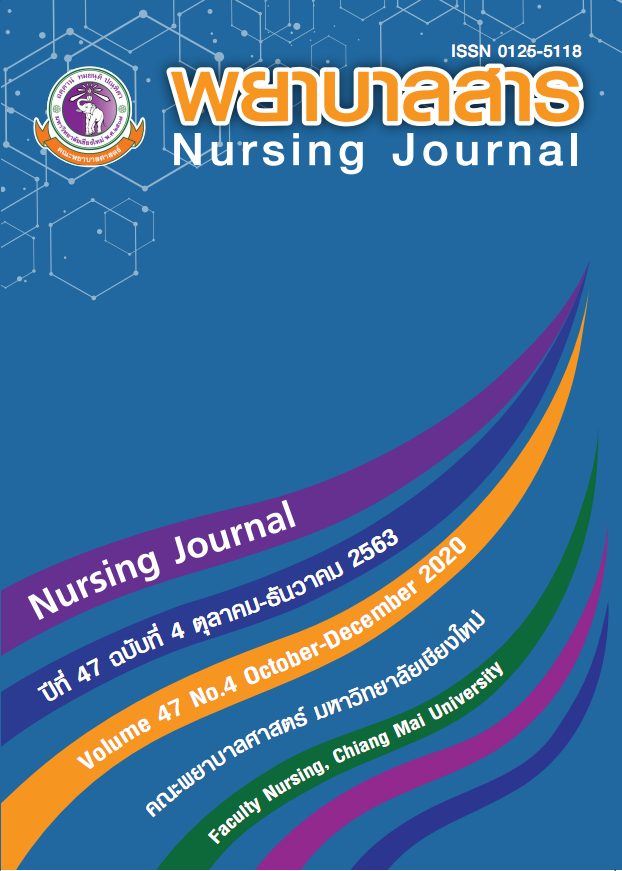Predicting factor of remission in persons with schizophrenia,Srithaya Hospital
Keywords:
remission, schizophrenia, predicting factorAbstract
Schizophrenia is one of the major issue on psychiatric problems. The effect of schizophrenia is usually severe and chronic, however the current treatment has been advanced so that many symptoms can be managed easier. The purpose of this descriptive research was to determine predictors of remission in persons with schizophrenia. The factors predicting variables were gender, duration of untreated psychosis, duration of illness, cognitive insight, medication adherence, highly-expressed emotion in family, and cognitive function. Subjects were persons with schizophrenia treated as in-patients and out-patients in Srithanya Hospital chosen purposively. A total of 220 patients were equally divided into two groups: remission and non-remission. The research instruments were demographic interview, The Beck Cognitive Insight Scale, medication adherence behavior questionnaire, The Level of Expressed Emotion, and Thai Mini-Mental State Examination. Data were analyzed by logistic regression.
The result was that factors predicting of remission in schizophrenic patients include three variables could significantly at the .05 levels were namely, cognitive function, medication adherence and cognitive insight. The logistic response formula were: Predited logit (remission in persons with schizophrenia) = -13.066 + 0.130*(insight) +0.071*(medication Adherences) + 0.325*(cognitive function). These predictors were accounted for 46.8 percent. Thus, medication adherence and cognitive function are factors that persons with schizophrenia should have and be promoted by the nurse in order to make progress in their remission of symptom.
References
Beck, A. T., Baruch, E., Balter, J. M., Steer, R. A., & Warman, D. M. (2004). A new instrument for measuring insight: The Beck Cognitive Insight Scale. Schizophrenia research, 68(2), 319-329.
Cannavo, D., Minutolo, G., Battaglia, E., & Aguglia, E. (2016). Insight and recovery in schizophrenic patients. International Journal of Psychiatry in Clinical, 20(2), 83-90.
Cole, J. D., & Kazarian, S. S. (1988). The level of expressed emotion scale: A new measure of expressed emotion. Journal Psychology, 44(3), 392-397.
Damruk, P. (2002). A study of being healthy of community psychiatric patients in three southern border provinces (Master’s thesis, Chulalongkorn University). (In Thai)
Farragher, B. (1999). Treatment compliance in the mental health service. Iris Medication Journal, 92(6), 1-3.
Kanchanarak, O. (2002). Factors predicting medication adherence behavior of schizophrenic patients in community (Master’s thesis, Chulalongkorn University). (In Thai)
Kopelowicz, A., Liberman, R. P., Ventura, J., Zarate, R., & Mintz, J. (2005). Neurocognitive correlates of recovery from schizophrenia. Psychological medicine, 35(8), 11-65.
Kane, J. M. (2007). Treatment adherence and long-term outcomes. CNS spectrums, 12(17), 21-26.
Ketchai, S., Sitthimongkol, Y., Vongsirimas, N., & Petrasuwan, S. (2012). Predictors of depressive symptoms in individual with f–episode schizophrenia. Journal of Nursing Science, 30(4), 90-101. (In Thai)
Lawley, D. N., & Maxwell, A. E. (1971). Factor analysis as a statistical method. London: Butterworth & Co.
Left, P. J., & Vaughn, C. E. (1981). Patterns of emotional response in relatives of schizophrenic patients. Schizophrenia Bulletin, 7(1), 43-44.
Liberman, R. P., & Kopelowicz, A. (2002). Recovery from schizophrenia: a challenge for the 21st century. International Review of Psychiatry, 14(4), 245-255.
Folstein, M. F., Folstein, S. E., & McHugh, P. R. (1975). ‘Mini-mental stage’ a practical method for grading the cognitive state patients for the clinician. Journal Psychiatry, 12(3), 189-198.
Novick, D., Haro, J. M., Suarez, D., Vieta, E., & Naber, D. (2009). Recovery in the outpatient setting: 36-month results from the Schizophrenia Outpatients Health Outcomes (SOHO) study. Schizophr Res, 108(1-3), 223-230.
Resnick, S. G., Rosenheck, R. A., & Lehman, A. F. (2004). An exploratory analysis of correlates of recovery. Psychiatric Services, 55(5), 540-547.
Robinson, D. G., Woerner, M. G., McMeniman, M., Mendelowitz, A., & Bilder, R. M. (2004). Symptomatic and functional recovery from a first episode of schizophrenia or schizoaffective disorder. Am J Psychiatry, 161(3), 473-479.
Rosen, K., & Garety, P. (2005). Predicting recovery from schizophrenia: a retrospective comparison of characteristics at onset of people with single and multiple episodes. Schizophrenia Bulletin, 31(3), 735-750.
Seo, J. M., Ahn, S., Byun, E. K., & Kim, C. K. (2007). Social skills training as nursing intervention to improve the social skills and self-esteem of inpatients with chronic schizophrenia. Archives of psychiatric nursing, 21(6), 317-326.
Smith, T. E., Hull, J. W., Huppert, J. D., Silverstein, S. M., Anthony, D. T., & McClough, J. F. (2004). Insight and recovery from psychosis in chronic schizophrenia and schizoaffective disorder patients. Journal of psychiatric research, 38(2), 169-176.
Saengpak, C., Tungpunkom, P., & Kitsumban, V. (2017). Effect of the adherence therapy on medication adherence among persons with schizophrenia in community. Nursing Journal, 44(1), 137-148. (In Thai)
Sukthong, K. (2011). Effects of family group psychoeducation on burden and high expressed emotion in caregivers of schizophrenic patients in community (Master’s thesis, Chulalongkorn University). (In Thai)
Train The Brain Forum Committee. (1993). Thai Mental State Examination (TMSE). Siriraj Hospital Gazette, 45(6), 359-374. (In Thai)
Uthaiphan, R. (2013). The effect of group motivational interviewing on medication compliance of schizophrenic patients in community. The Journal of Psychiatric Nursing and Mental Health, 27(1), 136-148. (In Thai)
Wyatt, R. J. (1991). Neuroleptics and the natural course of schizophrenia. Schizophrenia bulletin, 17(2), 325.
Washiradilok, P. (2006). Effectiveness of motivation interviewing and cognitivebehavioral therapy for treatment compliance in schizophrenia (Master’s thesis, Khon Kaen University). (In Thai)
Wunderink, L., Sytema, S., Nienhuis, F. J., & Wiersma, D. (2008). Clinical recovery in first-episode psychosis. Schizophrenia Bulletin, 35(2), 362-369.
Downloads
Published
How to Cite
Issue
Section
License
บทความที่ได้รับการตีพิมพ์เป็นลิขสิทธิ์ของวารสารพยาบาลสาร
ข้อความที่ปรากฏในบทความแต่ละเรื่องในวารสารวิชาการเล่มนี้เป็นความคิดเห็นส่วนตัวของผู้เขียนแต่ละท่านไม่เกี่ยวข้องกับมหาวิทยาลัยเชียงใหม่ และคณาจารย์ท่านอื่นๆในมหาวิทยาลัยฯ แต่อย่างใด ความรับผิดชอบองค์ประกอบทั้งหมดของบทความแต่ละเรื่องเป็นของผู้เขียนแต่ละท่าน หากมีความผิดพลาดใด ๆ ผู้เขียนแต่ละท่านจะรับผิดชอบบทความของตนเองแต่ผู้เดียว






